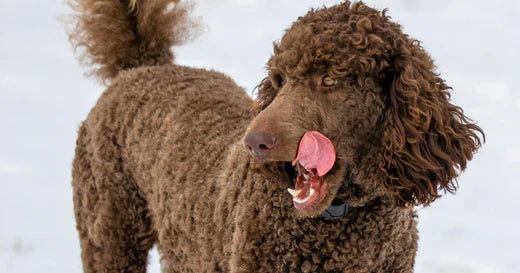Poodles are amazing family pets that love to snuggle up and keep their owners company when reading books, watching television, taking naps, or just hanging out. Although they're famous for their intelligence and elegant look, these dogs are complex animals with specific needs. But beyond the obvious behaviors that are observed, there are so many interesting facts about poodles that kids would love to know. They have a long history of being bred and groomed as show dogs due to their high intellect and trainability. Easily recognizable by distinct, curly coats, poodles have a reputation for being active and perhaps a bit unfriendly toward other dogs. Read more to learn more valuable information about poodles.

What To Know About Poodles Before Adopting
Understanding the unique characteristics of poodles before you adopt is key to ensuring a happy life for both you and your new dog. One of the most significant considerations is their grooming. Poodles have hair, not fur, which means they don't shed much and are often considered hypoallergenic. The trade-off is that their coat grows continuously and mats easily. Without frequent brushing and professional grooming every four to six weeks, their coat can become painfully matted and may require a complete shave-down. Beyond their coat, poodles are also incredibly intelligent and energetic. Their high intelligence makes them very trainable, but it also means they need a lot of mental and physical stimulation. A bored poodle can quickly become a destructive one. Finally, you should be prepared for their sensitive and complex temperament. Poodles are affectionate, loyal, and playful, but they also form strong bonds with their owners and can be prone to separation anxiety. Early socialization and gentle, consistent training are essential to help them become well-adjusted family members.
Valuable Information About Poodle Behavior
Kids who love their poodles can tell all kinds of stories about what life is like living with these amazing dogs. Anecdotal evidence of intelligence is shared through all the different clever behaviors witnessed every day, and expressed throughout children's books about poodles. In the meantime, here is some amazing information about the intelligence, behavior, social tendencies, and even haircuts especially for poodles. All of this information is important for families to understand before adopting a rescue dog that is a purebred or poodle mix. Bringing a new furry friend into the family necessitates a bit of research to find one that will easily adapt to the household. Many people make the unfortunate mistake of selecting a dog based on a quick trip to the humane society or a local pet adoption event without fully understanding the animal. A few minutes playing with a dog does not provide enough insight about the breed to make an informed decision. If a poodle is on your family's radar, take some time to read through these interesting poodle facts that will shed light on the intelligence, behavior, social tendencies, and some quirky trivia about this type of dog.

(1) Poodles were originally bred to be hunters.
This fact may come as a surprise to those who think of poodles as prim and proper dogs with fancy haircuts. In fact, poodles are as adept at hunting as labradors and other associated breeds. They are amazing swimmers which makes them quite adept at hunting waterfowl like ducks and geese. Poodles are also excellent assistants for pheasant hunters. After the birds are shot, poodles retrieve these injured targets without crushing their bodies.
(2) Poodles are considered one of the most intelligent dog breeds.
For this reason, poodles score highly at dog shows. They routinely outperform all other dogs in demonstrations involving both agility and obedience. Poodles can be trained to do a variety of tricks, like walking on their back paws and jumping effortlessly through hoops. Poodles also can acquire an understanding of around 400 words, whereas the average canine comprehends approximately 165 words. The downside of having such intelligence is that poodles get bored easily. Poodle owners have reported destructive behavior that is usually associated with long periods without any form of stimulation.
(3) Poodles don't particularly like other dogs.
When observed at dog parks, poodles tend to stick by their owner's side rather than socializing with the other canines. Even if the poodle ventures out to sniff or briefly run with the others, these dogs typically return to their humans after a short period of time. The only real exception is when other poodles are also at the park and they seem to be drawn together for more extended playtime. So if you are considering adding a new dog to your family and already have a poodle at home, be prepared for some initial resistance to the new intruder.

(4) A poodle's haircut is about functionality, not style.
Poodles have very distinctive haircuts which was originally more about function than style. Poodles are waterdogs, so it makes sense that less hair would help them swim more efficiently. However, they still need some degree of protection from the cold water. For this reason, owners leave puffs of hair around their joints and torso to protect vital organs from frigid water.
(5) Poodles can be put to work by performing important jobs.
Because they are so intelligent and highly trainable, poodles are often utilized as guide dogs for people with disabilities. They are frequently fill the roles of therapy dogs and service dogs due to their keen ability to identify the physical and emotional needs of their owners.
(6) Poodles once (unsuccessfully) raced in the Iditarod.
Back in 1988, one particular musher named John Suter had the not-so-bright idea ofcompeting with a team of Standard Poodles. Certain characteristics seemed to align with the race, like both the high energy and trainability of poodles. However, what he did not account for was the fact that the breed does not do well in the cold. The dogs suffered from frozen paws and matted hair, requiring many of them to be dropped at various checkpoints along the route for medical care. Mushers are now only allowed to enter dogs bred for the cold weather, like Alaskan Huskies.
(7) There are four different varieties of poodles.
Despite the fact that all poodles are part of the same breed, there are so many variations that they sometimes seems like different types of dogs entirely. In fact, there are four distinct varieties based entirely on the dog's size. The classifications are: Standard, Medium, Miniature, and Toy poodle. While they may come in vastly different sizes, poodles all share the same thick, curly coats of hair all sorts of colors.
(8) Poodles are popular choices for families who suffer from allergies.
Finding the perfect pet for allergy-sufferers is not easy, but poodles come pretty darn close. This breed is considered hypoallergenic, which means the dogs are less likely to trigger an allergic reaction. Their curly coats shed far less dead hair and produce dramatically less dander than just about any other. Although no dog is 100% hypoallergenic, poodles come the closest.
(9) Blue Poodles command a price upwards of $10,000.
With coats that are a beautiful shade of silvery blue, these rare poodles cost a pretty penny. In order to maintain the color of the coat, these poodles are bred selectively. Some mistakenly believe these dogs are a mixed breed, creating the blueish hue, however they actually have a gene that causes black coats to fade to a lighter bluish color. Although Blue Poodles are not common, an even rarer poodle coloration exists. Apricot Poodles can thank a recessive gene for their beautiful coat, one that has only recently become part of the poodle family.

(10) Poodles are eager to please their owners.
Poodles have a well-earned reputation for wanting to please their owners, a trait rooted in their history as working dogs. Bred in Germany as waterfowl retrievers, they needed to be intelligent and highly responsive to their handler's every command. This legacy has made them a breed that is not only smart but also deeply motivated to cooperate and form strong bonds with their human families. You'll see this in their love for learning new tricks, their quick response to commands, and how much they thrive on positive reinforcement. Poodles are happiest when they are an active part of their family's daily life.
(11) Poodles are very athletic.
The popular image of poodles as pampered, delicate show dogs is misleading. In reality, they are highly athletic and robust. Poodles have a muscular, well-proportioned build with a straight back, deep chest, and powerful hindquarters. This physical structure gives them impressive jumping ability, speed, and endurance. Their athleticism is rooted in their history: poodles were originally bred in Germany as water retrievers for hunters. Their name, from the German word "Pudel," even means "to splash in water," a perfect description of their original job, which required them to be strong, agile, and have great stamina.
(12) Poodles tend to have long lifespans.
Keep in mind that the lifespan of a poodle largely depends on its size. Like many dog breeds, the smaller the poodle, the longer its life expectancy tends to be. Toy and miniature poodles typically have the longest lifespans, often living 14 to 18 years, and sometimes longer. Standard poodles, being the largest variety, have a shorter lifespan, usually around 10 to 13 years. These are just general averages. A poodle's individual health is also heavily influenced by its genetics, diet, exercise, and consistent veterinary care. Providing a healthy lifestyle is the most important factor for any poodle to live a long and happy life.

More Facts for Animal Lovers
Children are naturally fascinated by the animal kingdom, from poodles to penguins. This deep curiosity stems from a mix of psychological, developmental, and educational factors.Learning about different creatures is a great way to introduce kids to science and nature. It can spark a lifelong love for the world around them, encouraging them to ask questions and seek out new information. Here are some more animal fact lists that kids will love to know.






